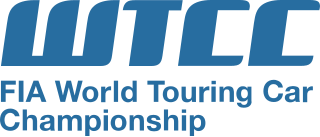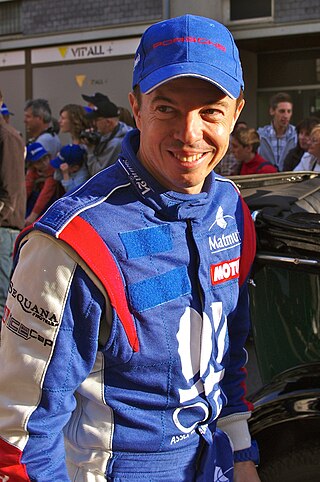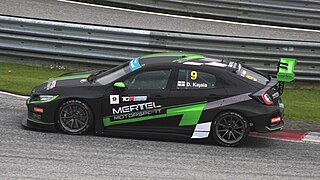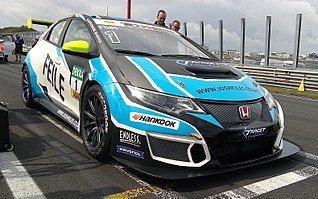
The FIA World Touring Car Championship was an international touring car championship promoted by Eurosport Events and sanctioned by the Fédération Internationale de l'Automobile (FIA). It has had several different incarnations, including a single season in 1987 as the World Touring Car Championship and most recently a world championship (WTCC) that has run between 2005 and 2017. Following the 2017 season, an agreement was reached for the FIA WTCC to become FIA WTCR and use the TCR technical regulations.
The European Touring Car Championship was an international touring car racing series organised by the FIA. It had two incarnations, the first one between 1963 and 1988, and the second between 2000 and 2004. In 2005 it was superseded by the World Touring Car Championship, and replaced by the European Touring Car Cup between 2005 and 2017 when became also defunct.

The 2002 FIA GT Championship was the sixth season of the FIA GT Championship, an auto racing series regulated by the Fédération Internationale de l'Automobile (FIA) and organized by the Stéphane Ratel Organisation (SRO). The races featured grand touring cars divided into two categories and awarded championships and cups for drivers and teams in each category. The season commenced on 21 April 2002 and concluded on 20 October 2002 with ten races held through Europe.

The 2001 FIA GT Championship was the fifth season of FIA GT Championship, an auto racing series endorsed by the Fédération Internationale de l'Automobile (FIA) and organized by the Stéphane Ratel Organisation (SRO). The races featured grand touring cars divided into two categories and awarded drivers and teams championships and cups for each category. The season began on 31 March 2001 and ended on 21 October 2001 after eleven races held in Europe, and included for the first time the Spa 24 Hours as a premiere endurance event for the series.

The 2005 World Touring Car Championship was the second season of World Touring Car Championship motor racing, and the first since 1987. It featured the 2005 FIA World Touring Car Championship which was contested over a ten event, twenty race series which commenced on 10 April and ended on 20 November. The championship was open to Super 2000 cars, Diesel 2000 cars and Super Production cars as defined by the FIA. Andy Priaulx won the Drivers' Championship and BMW won the Manufacturers' title.

Super 2000 is an FIA powertrain specification used in the World Rally Championship, the British Touring Car Championship, the World Touring Car Championship, and other touring car championships. The engines were originally 2 L naturally aspirated, and later being also allowed 1.6 L turbocharged units producing approximately 280 bhp.

The 2009 World Touring Car Championship season was the sixth FIA World Touring Car Championship season, the fifth since its 2005 return. It began on 8 March, and ended on 22 November, after twenty-four races. The championship, which was reserved for Super 2000 Cars and Diesel 2000 Cars, comprised two titles, the FIA World Touring Car Champion for Drivers and the FIA World Touring Car Champion for Manufacturers.
Aytaç Biter is a Turkish auto racing driver.
The 2010 FIA European Touring Car Cup was the sixth running of the FIA European Touring Car Cup. The cup was expanded to three events for 2010, unlike in previous years where it was a one-off event. The season began at Braga on 28 March, and finished at Franciacorta on 17 October. Each event included two races of 50 kilometres in length, making a total of six rounds awarding points. At the end of the season, three FIA cups were awarded, one for each of the eligible categories: Super 2000, Super 1600 and Super Production. 100,000 euro prize money was awarded at each of the four race meetings: 65,000 euros to Super 2000, 25,000 to Super 1600 and 10,000 to Super Production.
The 2012 FIA European Touring Car Cup is the eighth running of the FIA European Touring Car Cup. It will consist of four events in Italy, Slovakia and Austria. The events will consist of two races run over a distance of approximately 50 kilometres (31 mi) each. For the first time, five FIA categories will be eligible to enter: Super 2000, Super 1600, Super Production, SEAT León Supercopa and Renault Clio Cup.
The 2013 FIA European Touring Car Cup was the ninth running of the FIA European Touring Car Cup. It consisted of five events in Italy, Slovakia, Austria and the Czech Republic. The championship was split into three categories: Super 2000, Super 1600, and the Single-Make Trophy for cars such as the SEAT León Supercopa. The Super Production category was abolished for this season. The 2013 season saw the introduction of the Lady Trophy Cup, with the best-placed female driver in either of the categories at each event receiving €10,000 in prize money. Diesel engines were banned from the championship.

The 2014 FIA World Touring Car Championship was a motor racing competition organised by the Fédération Internationale de l'Automobile (FIA) for Super 2000 Cars. It was the eleventh FIA World Touring Car Championship, and the tenth since the series was revived in 2005.

Davit "Data" Kajaia is a Georgian racing driver, best known for winning the Legends Euro Nations Cup in 2012 and 2013. He currently drives for the MIA Force team in the Georgian Circuit Championship.
The 2014 FIA European Touring Car Cup was the tenth running of the FIA European Touring Car Cup. It consisted of five events in France, Slovakia, Austria, Belgium and Italy. The championship was split into three categories: Super 2000 for TC2 Turbo and TC2 machinery, Super 1600, and the Single-Make Trophy for cars such as the SEAT León Supercopa.

Kaan Önder, is a former Turkish race driver. He was mentored by triple world champion Andy Priaulx in 2014 and 2015.

The TCR International Series was an international touring car championship. The championship was promoted by World Sporting Consulting (WSC), founded by former World Touring Car Championship manager Marcello Lotti. It was marketed as a cost-effective spin-off of the WTCC, targeted at C-segment hatchbacks production-based touring cars. The title TCR follows the naming convention now used by the FIA to classify the cars that compete in touring car racing, with TC1 referring to the top tier as used by the FIA WTCC and TC2 referring to the legacy cars which principally compete in the FIA ETCC.
The 2015 FIA European Touring Car Cup is the eleventh running of the FIA European Touring Car Cup. It will consist of six events in Hungary, Slovakia, France, Czech Republic, Belgium and Italy. The championship will be split into three categories: Super 2000 for TC2 Turbo and TC2 machinery, Super 1600, and the Single-Make Trophy for cars such as the SEAT León Supercopa.
The 2016 FIA European Touring Car Cup was the twelfth running of the FIA European Touring Car Cup. It consisted of six events in France (twice), Slovakia, Germany, Portugal and Italy.
The 2017 FIA European Touring Car Cup was the thirteenth and last running of the FIA European Touring Car Cup. It consists of six events in Italy, Hungary, Germany, Portugal, Belgium and Czech Republic. The championship is again split into two categories: ETCC 1 and ETCC 2.

A TCR Touring Car is a touring car specification, first introduced in 2014 and is now employed by a multitude of series worldwide. All TCR Touring Cars are front-wheel drive cars based on 4 or 5 door production vehicles, and are powered by 1.75 to 2.0 litre turbocharged engines. While the bodyshell and suspension layout of the production vehicle is retained in a TCR car, and many models use a production gearbox, certain accommodations are made for the stresses of the racetrack including upgraded brakes and aerodynamics. Competition vehicles are subject to balance of performance (BoP) adjustments to ensure close racing between different vehicles.











